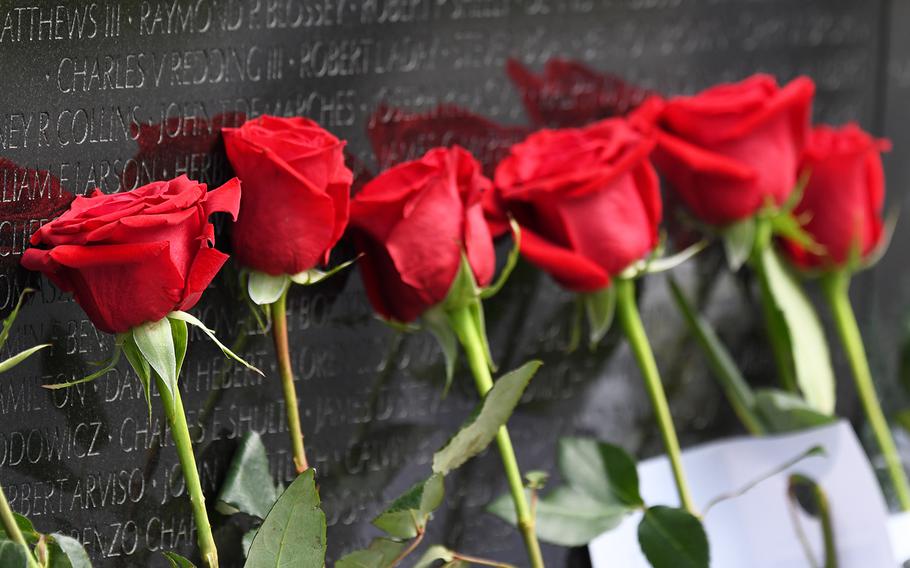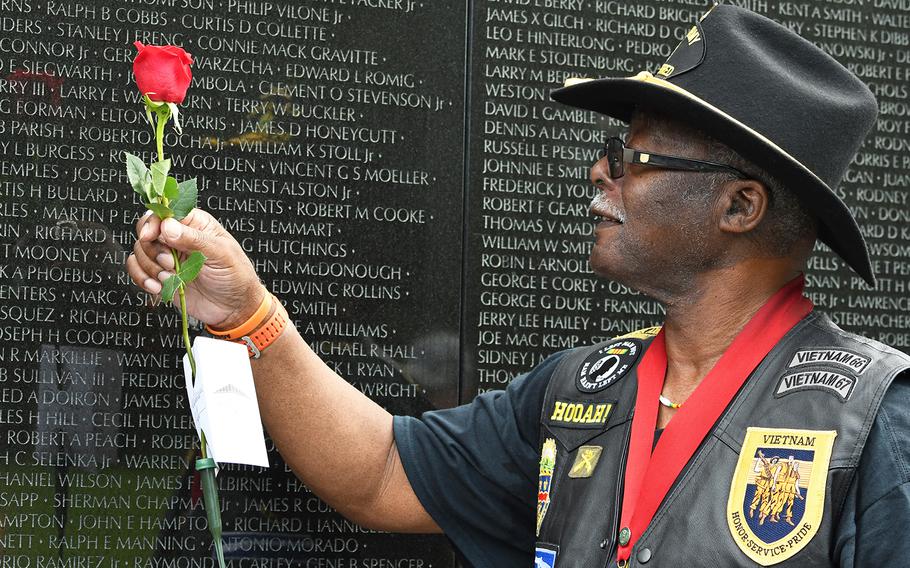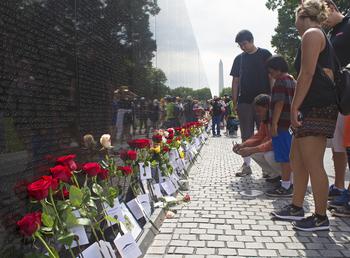
About 3,000 roses were placed at the Vietnam Memorial Wall in Washington, D.C., as part of the annual Father's Day Rose Remembrance. Red roses stood for those killed in action. (Meredith Tibbetts/Stars and Stripes)
WASHINGTON — Three thousand roses were placed carefully along the base of the wall at the Vietnam Veterans Memorial.
The colors of the flowers placed for the annual Father’s Day Rose Remembrance had special meaning: The 1,400 red roses were for those killed in action, the 1,200 yellow ones for those missing in action, and the 400 white-with-red-tip ones for "In Memory" honorees — Vietnam veterans who died after the war from war-related causes.
The Father’s Day event at the memorial, a grassroots effort started in part by Gary Alton, has been taking place since the early 1990s.
Vietnam veteran John Bickford, who had been a friend of Alton’s, has been doing the Rose Remembrance for 14 years. Bickford had placed at least 50 roses on Father’s Day this year, two specifically for friends he lost.
“Before we went over from Fort Riley, I made friends with a young guy. We got to Vietnam, he and a pilot were the first ones we lost. It was only about a month after we got there. They were missing for a long time – they eventually found the remains and ID’s them. They were buried maybe about 10 years ago down at Arlington.
“One of the pilots on the wall – I always try to put a rose for him," Bickford said. "He was like the enlisted man’s pilot. You’d go down into the town and he’d buy you a soda. He was one of the more enlisted-man types. A friendly guy.
“It just feels good to come down here, to help them out and put some of the roses on.”

Johnnie Downs places one of about 3,000 roses at the Vietnam Memorial Wall in Washington, D.C., as part of the annual Father's Day Rose Remembrance. (Meredith Tibbetts/Stars and Stripes)
Johnnie Downs, also a Vietnam veteran, was there to remember his brother, Herman, as well as a friend’s brother and a young Marine. To Downs, the Rose Remembrance signifies that “God allowed me to live this long to see and honor these young men that gave their ultimate sacrifices in the Vietnam War.
"Many of them didn’t get a chance to see their children," he said. "Many didn’t have a chance to see their children grow up. Many didn’t get a chance to see birthdays. Many of these guys here didn’t get to see their graduations. I come to honor them and be here for them today. I feel like that — as a survivor — is the least I can do to honor the fallen.”
There are more than 58,000 names on the Vietnam Memorial's wall, which was dedicated in 1983.
“There were so many teenagers there in the Vietnam War,” Downs said.

About 3,000 roses were placed at the Vietnam Memorial Wall in Washington, D.C., as part of the annual Father's Day Rose Remembrance. (Meredith Tibbetts/Stars and Stripes)
One of the men Downs placed a rose for was Dan Bullock, a Marine who was the youngest person killed in action in Vietnam. Bullock was only 15 when he died — he had altered the date on his birth certificate to say he was born in 1949 rather than 1953. According to a short biography left near his name at the wall, Bullock arrived in Vietnam on May 18, 1969. Less than a month later, on June 7, he was killed while making an ammunition run.
Downs, who is now 72, was drafted on the same day as his brother — and they went to Vietnam on the same day as well. Johnnie Downs, a year older than his brother, was a soldier in the 73rd Engineer Co. Herman Downs saw action on Hill 55 as a U.S. Marine. They were both teenagers, people from the city of Akron, Ohio, sent to the jungles of Vietnam.
They both made it back from the war, but Herman Downs returned a changed man — and he would become sick in later years due to exposure to Agent Orange.

The colored roses for the annual Father’s Day Rose Remembrance each had a meaning: The 1,400 red roses were for those killed in action, the 1,200 yellow roses were for those missing in action, and the 400 white with red tips roses symbolize In Memory honorees - Vietnam veterans who died after the war from war related causes. (Meredith Tibbetts/Stars and Stripes)
“My brother passed away in one of the most horrible cases of Agent Orange in this country,” Johnnie Downs said. Herman Downs underwent an operation in which they removed his tongue.
“Inside of his mouth was boot black. They split my brother's face down the middle, pulled his face apart and cut his tongue out. The operation took over 24 hours. Then, after my brother had his tongue out, six months later, the cancer came back and completely ate his whole face off of his shoulders. So we had to call in a plastic surgeon. Agent Orange literally ate him up.”
“The last day I seen my brother, I went to the VA hospital and he was laying there. His face was rotting flesh ... I never saw a monster movie that looked as bad as he did that day.”
Herman Downs died at age 42 on June 5, 1990.

About 3,000 roses were placed at the Vietnam Memorial Wall in Washington, D.C., as part of the annual Father's Day Rose Remembrance. Among the roses was this hat. (Meredith Tibbetts/Stars and Stripes)
In April 2017, Johnnie Downs was diagnosed with diabetic neuropathy, which he said is from his exposure to Agent Orange.
“I’m not concerned today about my brother. I’m not concerned about myself. My biggest concern right now: Have I passed Agent Orange in the DNA of my children? Have I passed DNA over to my grandchildren? Have I passed DNA over to the great-grandchildren?” His voice breaking, Downs added, “I prayed with my kids to ask them them to forgive me if I poisoned them with Agent Orange and what it’s done.”
The physical toll on Downs to visit the Vietnam Memorial Wall was immense.
“Every day, it took everything I did to come here, because I’ve been in so much pain since I have been diagnosed. Diabetic neuropathy from Agent Orange is one of the most painful and excruciating pains that I’ve had to deal with in my 72 years of living.”
Despite the pain, Downs walked the length of the wall and placed his roses. He stopped and smiled, too, when a crowd of people swarmed him and asked for his photograph.
“This is very emotional for me to be here today," he said. "Just to see these and recognize these young men. Some of these young men didn’t have a chance in life. We were drafted. We had to do what they told you to do. At that time in my life, at 18, 19, you don’t know nothing about life.”
That could be why Downs' heroes are the names on the wall.
“I don’t have any heroes. My heroes don’t dribble a basketball. My heroes don’t throw a football. My heroes are the Vietnam veterans. My heroes are the persons on the wall today. Those are my heroes. I dearly love the men on that wall.”
tibbetts.meredith@stripes.com Twitter: @mjtibbs